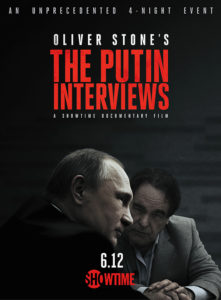What’s Wrong with Showtime’s The Putin Interviews

There’s something for everyone in the image of Vladimir Putin and his “new Russia.” Housewives find a man with a deep, unresentful love for his country. Racists find a political leader outspokenly concerned about the white birthrate. Libertarians find a flat, relatively low tax rate—subsidized, however, by energy tariffs. Liberals find an external enemy that they can use to avoid talking about healthcare, infrastructure, and wage distribution. Even so-called radicals seem to agree that anyone who distrusts the IMF, NATO, and the state department can’t be all bad.
Appealing to so many people, however, can be disastrous if done under false pretenses. By depending on so many distorted narratives and perceptions, it’s easy to lose everyone by trying not to lose anyone.
This contradiction—along with director Oliver Stone’s nauseating sycophancy, credulity, and political therapeutics—is what’s wrong with Showtime’s The Putin Interviews. A four-part documentary series meant to expose US audiences to a Vladimir Putin profoundly different than the one depicted on CNN or found in the pages of Foreign Affairs ends up only showing us just how despondent and disingenuous our own politics currently are.
Putin’s American fan base is a bizarre mixture of traditional Republican voters, authentic fascists, naïve Green Party supporters, and leftover Soviet sympathizers from the Cold War. Stone clearly thought he could craft a documentary that appealed to all of them. Thus, in the same series, we have hagiographic recollections about Ronald Reagan, authoritarian porn of Putin at his command post personally directing his ministers on matters of war and security, bromides about the importance of pluralism and human rights, and the casting of Russia’s foreign policy as primarily anti-fascist (Ukraine) and anti-terrorist (Syria).
To be fair, Putin’s rhetoric in many instances does sound markedly left-wing. He tells Stone that he believes both of the major political parties in the United States are corrupt, that American citizens can’t vote out the security state, that our economy works in the interest of global plutocrats, that we are an empire doomed to financially self-destruct, and that, at the moment, the two gravest threats to world peace are nuclear proliferation and environmental catastrophe. While this is all obviously just inter-imperial chauvinism on Putin’s part, Stone of course confuses it for genuine anti-capitalism and anti-imperialism.
Nevertheless, Putin shows his true colors whenever he talks about Russia’s internal affairs. It’s then that we hear the same old right-ring talking points about upholding “traditional values,” the trade-offs between security and liberty, and how every time he uses military force it’s only for defensive or retaliatory purposes. In Stone’s appearance on The Late Show with Stephen Colbert, he himself referred to Putin as a “social conservative” and a “strong nationalist,” which in a domestic context (one would assume) would make him persona non grata to the Hollywood director. On the other hand, segments of the political Left have always had a soft spot for nationalists who—if homegrown—they’d merely smirk at.
The conversations between Stone and Putin took place on-and-off from July 2015 to February 2017. The two ended up spending over twenty hours together, and in that time Stone certainly developed affection for Putin, and Putin certainly convinced Stone that the feeling was somewhat mutual. Here’s Stone mesmerized by Putin’s managerial tenacity: “You’re an excellent CEO of a company, and your company is Russia” (a gloomy analogy for Stone’s normal left-liberal audience). Here’s Stone fawning over the Russian president’s oratorical style: “You’re always so rational every time you’re asked a question—do you ever have a bad day?” Finally, while watching a tenth anniversary video of Putin’s Munich speech, famous for its denunciation of US military belligerence, Stone goes full fanboy: “[Putin] looks good. Could’ve been a movie star.”
Putin, for his part, uses his notoriously unsubtle approach to flattery in courting Stone. A particularly stomach-churning case of this occurs in the third episode when Stone “randomly” discovers his 2012 book (co-written with Peter Kuznick), The Untold History of the United States, on the shelf in Putin’s Kremlin office—Stone’s being one of only three books in the stack.
Stone has never missed an opportunity to pass over obvious facts in pursuit of hidden conspiracies. In doing so he’s caused quite a bit of damage to left-wing thought in America—replacing economic analysis with a political paranoia that’s essentially no different than what one can find on the far-right fringe (sometimes with different heroes but almost always with the same villains). Still, it’s sad to see the director of so many brilliant and iconic films clearly losing his senses. Throughout the series, Stone looks frazzled and lugubrious. He walks around exacerbated, swinging his hands and arms aloofly, staring dead-eyed out of frame, disarranging his hair, and often laughing alone and at nothing.
The Putin Interviews creates a false choice between US imperialism and Russian authoritarianism. One can agree with all of Putin’s criticisms of the US (that the economy is organized to benefit the rich, that both major parties are corrupt, that there’s such a thing as a national-security establishment), while simultaneously finding the Putin regime’s revanchism, propaganda, and anti-liberty policies intolerable. The Putin Interviews is a dramatized version of the lazy, anything-but-America mentality all too common nowadays in a lot of left-wing radicalism. It’s also a vehicle for Trumpist grievances about how the Washington consensus is preventing the president from affecting real change. Certainly not the ideological peace pact many of us would prefer and, if history is any indication, not one that can last either.
